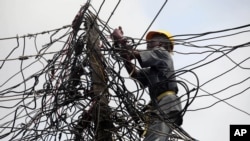ABUJA — A Canadian power company is set to take over operations of Nigeria’s government-owned power transmission company next week. Energy officials say this is a major step towards privatizing the energy industry - a move they hope will end the power shortages that cripple the Nigerian economy.
Nigerian officials say a lot of the country’s power is lost in transportation. Dilapidated and mismanaged electrical grids waste about a forth of Nigeria’s electricity, which is roughly six times less than what the country needs to grow industry and power homes.
Right now, most people here do not have access to electricity. Those who do have it often only get a few hours of power a day. Anyone who can afford a generator has one.
The director general of the Energy Commission of Nigeria, Abubakar Sani Sambo, says beyond hurting industry and public health, electricity in Nigeria is a security issue. He says some young people turn to violence because they are unemployed and Nigeria needs more electricity to create more jobs.
“You also have darkness that in the night perpetrates evil," Sambo stated. "So security problems are being heightened by lack of power.”
Sambo says privatizing the power industry in Nigeria is essential to getting more electricity into businesses and homes.
On July 30, Canada’s Manitoba Hydro International takes control of the Transmission Company of Nigeria, a state-owned entity. It is a move industry regulators call a “critical milestone in the road map to power sector reform.”
Johnson Isaac Ondoma, an environmental consultant for both private and public builders in Abuja, says corruption and lack of rule of law in Nigeria has a way of destroying well-intended government programs.
However, he says that does not necessarily mean that this plan will fail. In the past decade, the privatization of the telecom industry has made mobile phones affordable enough for most Nigerians.
“If, in the long run, there is total privatization and the company runs independently we will get it right. We’ve seen it in the telecommunications industry, when telecommunication was deregulated,” said Ondoma.
The Energy Commission's Sambo, says privatization is a difficult process because it meets resistance from public energy employees - 40 percent of whom could lose their jobs in the coming years, as more private companies take control of the power business.
Regulators say Manitoba has three years to make the company “technically and financially efficient” and the Canadian company is required to provide training for staff already in place.
Nigerian officials say a lot of the country’s power is lost in transportation. Dilapidated and mismanaged electrical grids waste about a forth of Nigeria’s electricity, which is roughly six times less than what the country needs to grow industry and power homes.
Right now, most people here do not have access to electricity. Those who do have it often only get a few hours of power a day. Anyone who can afford a generator has one.
The director general of the Energy Commission of Nigeria, Abubakar Sani Sambo, says beyond hurting industry and public health, electricity in Nigeria is a security issue. He says some young people turn to violence because they are unemployed and Nigeria needs more electricity to create more jobs.
“You also have darkness that in the night perpetrates evil," Sambo stated. "So security problems are being heightened by lack of power.”
Sambo says privatizing the power industry in Nigeria is essential to getting more electricity into businesses and homes.
On July 30, Canada’s Manitoba Hydro International takes control of the Transmission Company of Nigeria, a state-owned entity. It is a move industry regulators call a “critical milestone in the road map to power sector reform.”
Johnson Isaac Ondoma, an environmental consultant for both private and public builders in Abuja, says corruption and lack of rule of law in Nigeria has a way of destroying well-intended government programs.
However, he says that does not necessarily mean that this plan will fail. In the past decade, the privatization of the telecom industry has made mobile phones affordable enough for most Nigerians.
“If, in the long run, there is total privatization and the company runs independently we will get it right. We’ve seen it in the telecommunications industry, when telecommunication was deregulated,” said Ondoma.
The Energy Commission's Sambo, says privatization is a difficult process because it meets resistance from public energy employees - 40 percent of whom could lose their jobs in the coming years, as more private companies take control of the power business.
Regulators say Manitoba has three years to make the company “technically and financially efficient” and the Canadian company is required to provide training for staff already in place.










